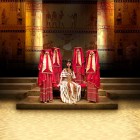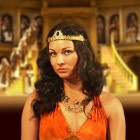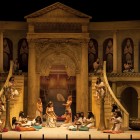Aïda 2017Ellen Kent Productions
Read more about the opera Aïda
This year's tour
The spring 2017 tour by the Ellen Kent organization, presented by Opera and Ballet International, as usual consisted of three works. The repertoire was generally popular, with mainstream Puccini (La bohème) and Verdi (Aïda) both seen frequently in the past. The one rarity, doubly welcome as it has never yet been presented either by the Edinburgh Festival or Scottish Opera, was Verdi's first masterpiece, Nabucco.
Edinburgh Playhouse saw all three, while Dundee, which is deprived of Scottish Opera's new staging in May, just had the Puccini. Glasgow hosted the two most popular pieces.
The schedule for the Scottish week was: Mon 27 Mar Glasgow Bohème; Tue 28 Mar Glasgow Aïda; Thu 30 Mar Edinburgh Bohème; Fri 31 Mar Edinburgh Nabucco; Sat 1 Apr Edinburgh Aïda; Sun 2 Apr Dundee Bohème. The OperaScotland team attended the last three of these.
Staging and performance
The impressive space of the Edinburgh Playhouse contained a good-sized and hugely enthusiastic audience for the Saturday evening Aïda. The staging, directed by Ellen Kent herself, made all its points effectively. The unit set was identical to that for the previous evening's Nabucco. While the curved structure with central arched entrance and stairway had no more to do with Egypt that it had with Babylon the night before, it nevertheless provided all the necessary vantage points for chorus and soloists. For the early temple proceedings some characteristic statues of Anubis were added. Later, for the Nile scene, these were replaced by a pair of sphinxes. The lighting was effectively varied, and costumes were colourful and appropriately traditional as regards period and location.
The orchestra under Vasyl Vasylenko gave a good account of the score, though some delicate and lovely postludes at the end of arias were cut to allow applause. There was an adequate chorus in terms of numbers - young and healthy voices that provided a well-focused sound for the big scenes.
The soloists for the two Aïda performances during the week were the same team that appeared in Nabucco. Iuri Gisca and Zarui Vardanean were again on excellent form as Amonasro and Amneris, roles they had performed on previous visits. The tenor, Giorgio Meladze had, in most respects, the ideal voice for Radamès, with a burnished, heroic tone. Perhaps a little more variation of light and shade might make his interpretation even better. Vadym Chernihovskiy showed off his stalwart bass tones, just as he had the night before.
The second bass, Oleksandr Forkushak sounded like a different singer. His King of Egypt was powerful and firm-voiced, and made him the dominant presence on the stage. The previous night, as the High Priest of Baal, he had really struggled with his intonation, but here all went well. The other great surprise was the Aïda of Olga Perrier. To be frank, the idea of a soprano singing this highly demanding role the night after she had appeared as Abigaille seemed bizarre - indeed potentially reckless in vocal terms. However she did remarkably well, showing no sign of fatigue or of the expected strain from her earlier exertions. Perhaps she doesn't produce the soft, floated high notes of the ideal Aïda, but then few sopranos do.
This was a thoroughly enjoyable rendering of the opera. Many productions will strain to provide a sense of spectacle, but this presentation managed to demonstrate persuasively once again that by far the largest portion of the work is intimate drama.







